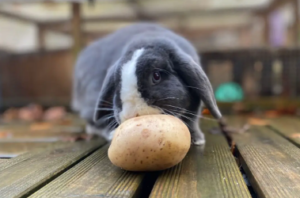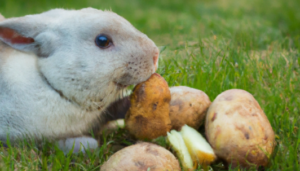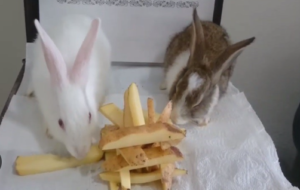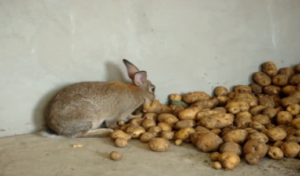Potatoes are a staple in many human diets, but are they safe for rabbits? As a responsible rabbit owner, it’s crucial to know which foods are safe for your furry friend and which can cause harm. While rabbits thrive on a diet primarily composed of hay, leafy greens, and a small number of pellets, many vegetables and root crops can pose serious health risks.
In this article, we’ll explore whether rabbits can eat potatoes, the potential dangers of feeding them this starchy vegetable, and what alternatives you can offer instead. This vet-approved guide will provide all the necessary details to keep your rabbit healthy and happy.
Can Rabbits Eat Potatoes?

No, rabbits should not eat potatoes. Potatoes are not toxic to rabbits, but they are high in starch and carbohydrates, which are difficult for rabbits to digest. Feeding potatoes to rabbits can lead to serious health problems, including digestive issues, obesity, and gastrointestinal stasis (a life-threatening condition in rabbits).
Although potatoes are a popular vegetable for humans, they offer no nutritional benefits for rabbits and should be avoided entirely.
You may learn something new from this: Can Rabbits Eat Cilantro?
Why Are Potatoes Unsafe for Rabbits?

Potatoes may seem harmless, but their nutritional composition makes them unsuitable for rabbits. Here are the main reasons why potatoes are not a good choice for your rabbit:
-
High Starch Content
Potatoes are rich in starch, which is a type of carbohydrate that rabbits cannot digest efficiently. A rabbit’s digestive system is designed to process fibrous foods like hay and leafy greens. Starchy foods like potatoes can cause imbalances in their gut bacteria, leading to digestive issues such as diarrhea and bloating.
-
Risk of Gastrointestinal Stasis
Feeding your rabbit starchy or high-carbohydrate foods can increase the risk of gastrointestinal (GI) stasis. GI stasis is a severe condition where the digestive system slows down or stops entirely, leading to a dangerous buildup of gas and bacteria in the gut. This condition can be fatal if not treated promptly.
-
Obesity and Weight Gain
Potatoes are calorie-dense and can contribute to obesity in rabbits if fed regularly. Obesity can lead to various health problems, including arthritis, heart issues, and reduced lifespan.
-
Lack of Nutritional Value
Unlike leafy greens and other rabbit-safe vegetables, potatoes offer little to no nutritional value for rabbits. They are low in essential vitamins and minerals that rabbits need to stay healthy.
What About Sweet Potatoes?
Many people assume that sweet potatoes might be a better option, but the answer is the same: Rabbits should not eat sweet potatoes. While sweet potatoes contain more vitamins than regular potatoes, they are still too starchy and high in carbohydrates to be a safe option for rabbits.
Can Rabbits Eat Potato Leaves or Stems?

No, rabbits should not eat potato leaves or stems. In fact, these parts of the potato plant are even more dangerous than the potato itself. Potato leaves, stems, and flowers contain solanine, a toxic compound that can cause poisoning in rabbits. Solanine can lead to symptoms such as:
- Lethargy
- Loss of appetite
- Diarrhea
- Abdominal pain
- Neurological issues
If your rabbit has consumed any part of a potato plant, contact a veterinarian immediately.
What Happens if a Rabbit Eats Potatoes?
If your rabbit accidentally consumes a small amount of potato, monitor them closely for any signs of digestive distress. Symptoms to watch out for include:
- Diarrhea
- Bloating
- Lethargy
- Loss of appetite
- Reduced fecal output
If you notice any of these symptoms, contact your vet right away. Even a small amount of potato can cause digestive problems, so it’s better to be safe than sorry.
Rabbit-Safe Alternatives to Potatoes
Instead of potatoes, consider offering your rabbit these safe and healthy vegetables:
| Safe Vegetables for Rabbits | Benefits |
| Romaine Lettuce | Low in calories, high in water content |
| Kale | Rich in vitamins A, C, and K |
| Parsley | Provides antioxidants and fiber |
| Bell Peppers | High in vitamin C |
| Carrots (in moderation) | Good source of beta-carotene |
| Zucchini | Low in calories and sugar |
| Cucumber | Hydrating and refreshing |
Always introduce new vegetables gradually and in small amounts to avoid upsetting your rabbit’s stomach.
Frequently Asked Questions (FAQ)
1. Can Rabbits Eat Cooked Potatoes?
No, rabbits should not eat cooked potatoes. Cooking does not remove the starch and carbohydrates that make potatoes unsuitable for rabbits. Additionally, cooked foods are not a natural part of a rabbit’s diet and can disrupt their digestive system.
2. Can Rabbits Eat Potato Chips?
No, rabbits should never eat potato chips. Potato chips are highly processed, salty, and contain unhealthy fats that can harm your rabbit’s health. Feeding junk food to rabbits can lead to serious health problems.
3. Can Baby Rabbits Eat Potatoes?
No, baby rabbits should not eat potatoes. Their digestive systems are even more sensitive than those of adult rabbits, making them more susceptible to digestive issues and GI stasis.
4. Are There Any Safe Root Vegetables for Rabbits?
Yes, some root vegetables are safe for rabbits in moderation, such as:
- Carrots (in small amounts)
- Parsnips
- Radishes
These root vegetables should be given sparingly, as they are still higher in sugar compared to leafy greens.
5. What Should I Do if My Rabbit Eats a Potato?
If your rabbit accidentally eats a small piece of potato, monitor them for signs of digestive distress. If any symptoms occur, contact your veterinarian immediately. It’s better to be cautious when dealing with potential digestive issues in rabbits.
How to Keep Your Rabbit’s Diet Balanced

A balanced diet is essential for your rabbit’s overall health. Here’s a quick guide to what a rabbit’s diet should look like:
- Hay (80-90% of their diet): Timothy hay, orchard grass, or meadow hay should be the main component of their diet.
- Fresh Vegetables (10-15%): Leafy greens and a small amount of non-starchy vegetables.
- Pellets (5%): High-quality rabbit pellets with no added sugars.
- Fresh Water: Always provide clean, fresh water.
Conclusion
While potatoes are a common vegetable in human diets, they are not suitable for rabbits. Potatoes are high in starch and carbohydrates, which can cause digestive issues, obesity, and gastrointestinal stasis in rabbits. Additionally, the leaves, stems, and flowers of the potato plant are toxic and should never be fed to rabbits.
Instead of potatoes, offer your rabbit safe and nutritious alternatives such as leafy greens and other non-starchy vegetables. Always prioritize a diet rich in hay and fresh water to keep your rabbit healthy and thriving. If you’re ever in doubt about what to feed your rabbit, consult with a veterinarian for professional advice.
